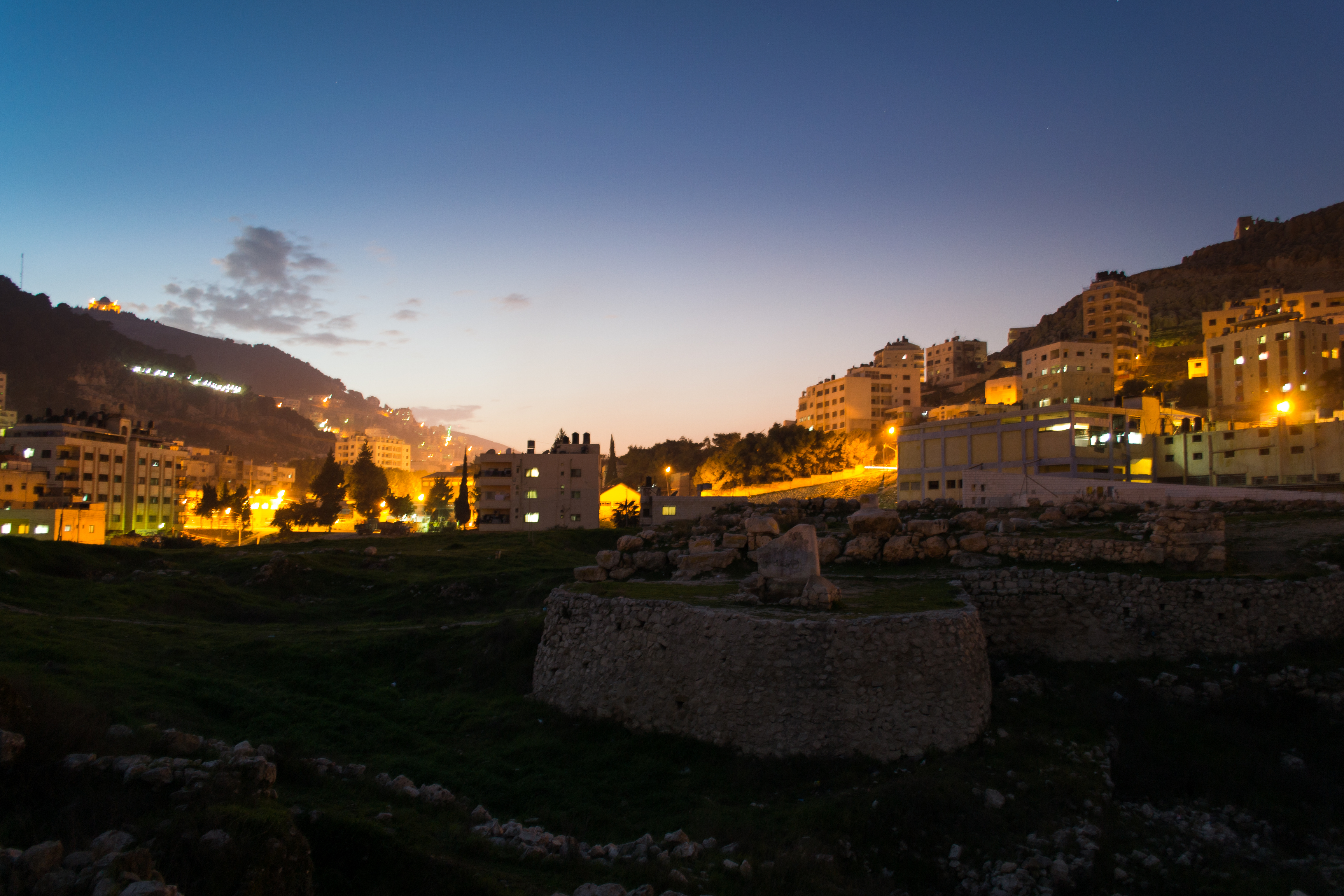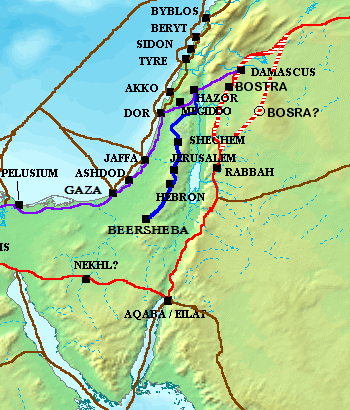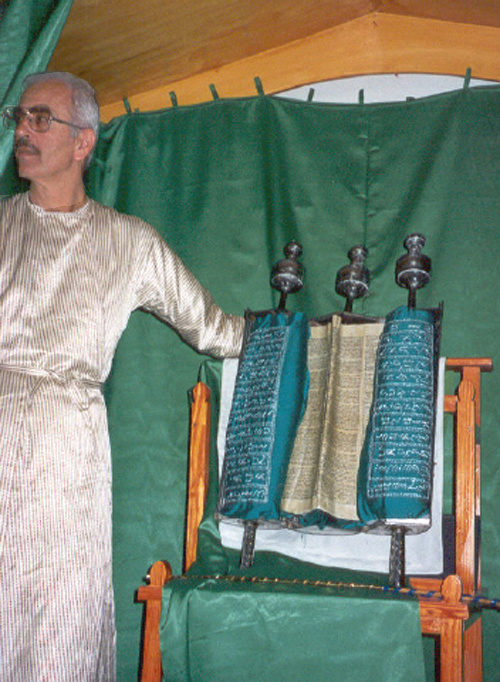|
Shiloh (biblical City)
Shiloh (; ) was an ancient city and sanctuary in History of ancient Israel and Judah, ancient Israel located in the modern-day West Bank. According to the Hebrew Bible, Shiloh was one of the main centers of Israelite worship during the pre-monarchic period, before the Solomon's Temple, First Temple in Jerusalem was built. After the Israelite conquest of Canaan, the Tabernacle was moved to Shiloh, and remained there during the period of the biblical judges. Shiloh has been positively identified with modern Khirbet Seilun, a tell (archaeology), tell known in Modern Hebrew as Tel Shiloh. It is located north of Jerusalem, in the West Bank, to the west of the modern Israeli settlement town of Shilo (Israeli settlement), Shilo and to the north of the Palestinian town of Turmus Ayya. Relative to other archaeological sites, it is south of the biblical town of Lebonah and north of Bethel. G. F. Moore has suggested identifying Bochim as Shiloh. Etymology The meaning of the word "Shiloh" ... [...More Info...] [...Related Items...] OR: [Wikipedia] [Google] [Baidu] |
Shilo, Mateh Binyamin
Shilo ( ') is an Israeli settlement in the northern West Bank. Located 28 miles (45 km) north of Jerusalem on Highway 60 (Israel–Palestine), Route 60 and organised as a religious community settlement (Israel), community settlement, it is neighboured by the Israeli settlements of Eli, Mateh Binyamin, Eli and Maale Levona and the Palestinian villages Sinjil, Turmus Ayya and Qaryut, and falls under the jurisdiction of Mateh Binyamin Regional Council. In it had a population of (the official census includes the population of Shvut Rachel and additional Israeli outpost, unincorporated communities to its east). The international community considers Israeli settlements in the West Bank International law and Israeli settlements, illegal under international law, but the Israeli government disputes this. History According to the Gush Emunim movement, Shilo was considered a potential site for a Israeli settlement, settlement as early as 1974. In January 1978, a modern community ... [...More Info...] [...Related Items...] OR: [Wikipedia] [Google] [Baidu] |
Israeli Settlement
Israeli settlements, also called Israeli colonies, are the civilian communities built by Israel throughout the Israeli-occupied territories. They are populated by Israeli citizens, almost exclusively of Israeli Jews, Jewish identity or ethnicity, and have been constructed on lands that Israel has militarily occupied since the Six-Day War in 1967. The international community considers International law and Israeli settlements, Israeli settlements to be illegal under international law, but Israel disputes this. In 2024, the International Court of Justice (ICJ) found in an advisory opinion that Israel's occupation was illegal and ruled that Israel had "an obligation to cease immediately all new settlement activities and to evacuate all settlers" from the occupied territories. The expansion of settlements often involves the confiscation of Palestinian land and resources, leading to displacement of Palestinian communities and creating a source of tension and conflict. Settlements a ... [...More Info...] [...Related Items...] OR: [Wikipedia] [Google] [Baidu] |
Jerome
Jerome (; ; ; – 30 September 420), also known as Jerome of Stridon, was an early Christian presbyter, priest, Confessor of the Faith, confessor, theologian, translator, and historian; he is commonly known as Saint Jerome. He is best known for his translation of the Bible into Latin (the translation that became known as the Vulgate) and his commentaries on the whole Bible. Jerome attempted to create a translation of the Old Testament based on a Hebrew version, rather than the Septuagint, as Vetus Latina, prior Latin Bible translations had done. His list of writings is extensive. In addition to his biblical works, he wrote polemical and historical essays, always from a theologian's perspective. Jerome was known for his teachings on Christian moral life, especially those in cosmopolitan centers such as Rome. He often focused on women's lives and identified how a woman devoted to Jesus should live her life. This focus stemmed from his close patron relationships with several pro ... [...More Info...] [...Related Items...] OR: [Wikipedia] [Google] [Baidu] |
Eusebius
Eusebius of Caesarea (30 May AD 339), also known as Eusebius Pamphilius, was a historian of Christianity, exegete, and Christian polemicist from the Roman province of Syria Palaestina. In about AD 314 he became the bishop of Caesarea Maritima. Together with Pamphilus, Eusebius was a scholar of the biblical canon and is regarded as one of the most learned Christians during late antiquity. He wrote the ''Demonstrations of the Gospel'', '' Preparations for the Gospel'' and ''On Discrepancies between the Gospels'', studies of the biblical text. His work '' Onomasticon'' is an early geographical lexicon of places in the Holy Land mentioned in the Bible. As "Father of Church History" (not to be confused with the title of Church Father), he produced the ''Ecclesiastical History'', ''On the Life of Pamphilus'', the ''Chronicle'' and ''On the Martyrs''. He also produced a biographical work on Constantine the Great, the first Christian Roman emperor, who was ''Augustus'' between A ... [...More Info...] [...Related Items...] OR: [Wikipedia] [Google] [Baidu] |
Book Of Judges
The Book of Judges is the seventh book of the Hebrew Bible and the Christian Old Testament. In the narrative of the Hebrew Bible, it covers the time between the conquest described in the Book of Joshua and the establishment of a kingdom in the Books of Samuel, during which Hebrew Bible judges, Biblical judges served as temporary leaders. The stories follow a consistent pattern: the people are unfaithful to Yahweh; he therefore delivers them into the hands of their enemies; the people repent and entreat Yahweh for mercy, which he sends in the form of a leader or champion; the judge delivers the Israelites from oppression and they prosper, but soon they fall again into unfaithfulness and the cycle is repeated. The pattern also expresses a repeating cycle of wars. But in the last verse (21:25) there is a hint that the cycle can be broken—with the establishment of a monarchy. While most contemporary critical scholars reject the historical accuracy of the Book of Judges, some arg ... [...More Info...] [...Related Items...] OR: [Wikipedia] [Google] [Baidu] |
Shechem
Shechem ( ; , ; ), also spelled Sichem ( ; ) and other variants, was an ancient city in the southern Levant. Mentioned as a Canaanite city in the Amarna Letters, it later appears in the Hebrew Bible as the first capital of the Kingdom of Israel (Samaria), Kingdom of Israel following the split of the Kingdom of Israel (united monarchy), United Monarchy. According to , it was located in the tribal territorial allotment of the tribe of Ephraim. Shechem declined after the fall of the Kingdom of Israel (Samaria), northern Kingdom of Israel. The city later regained its importance as a prominent Samaritans, Samaritan center during the Hellenistic Palestine, Hellenistic period. Traditionally associated with the city of Nablus, Shechem is now identified with the nearby site of Tell Balata in the Balata al-Balad suburb of the West Bank. Geographical position Shechem's position is indicated in the Hebrew Bible: it lay north of Bethel and Shiloh (Biblical city), Shiloh, on the high road ... [...More Info...] [...Related Items...] OR: [Wikipedia] [Google] [Baidu] |
Way Of The Patriarchs
The Road of the Patriarchs or Way of the Patriarchs ( ''Derech haʾAvot'' Lit. ''Way (of) the Fathers'') is an ancient north–south route traversing the land of Israel and the region of Palestine. The modern Highway 60 (Israel-Palestine) follows roughly the route of the Way of the Patriarchs. The name is used by biblical scholars because of mentions in biblical narratives that it was frequently travelled by Abraham, Isaac and Jacob. It is also called the Hill Road or the Ridge Route because it follows the watershed ridge line of the Samarian and Judaean Mountains. It runs from Megiddo and Hazor south to Beersheba by way of Shechem, Bethel, Jerusalem, Ephrath and Hebron. Unlike the Via Maris and the King's Highway which were international roads crossing the territories of many peoples, the Ridge Route was wholly within the territory of ancient Israel. Modern equivalent The modern Highway 60 follows roughly the route of the Way of the Patriarchs (without the more recent b ... [...More Info...] [...Related Items...] OR: [Wikipedia] [Google] [Baidu] |
Yahweh
Yahweh was an Ancient Semitic religion, ancient Semitic deity of Weather god, weather and List of war deities, war in the History of the ancient Levant, ancient Levant, the national god of the kingdoms of Kingdom of Judah, Judah and Kingdom of Israel (Samaria), Israel, and the king of the gods, head of the Pantheon (religion), pantheon of the Polytheism, polytheistic Yahwism, Israelite religion. Although there is no clear consensus regarding the geographical origins of the deity, scholars generally hold that Yahweh was associated with Mount Seir, Seir, Edom, Desert of Paran, Paran, and Teman (Edom), Teman, and later with Canaan. The worship of the deity reaches back to at least the early Iron Age, and likely to the late Bronze Age, if not somewhat earlier. In the oldest Bible, biblical texts, Yahweh possesses attributes that were typically ascribed to deities of weather and war, fructifying the Land of Israel and leading a Heavenly host#Hebrew Bible, heavenly army against the ... [...More Info...] [...Related Items...] OR: [Wikipedia] [Google] [Baidu] |
Highway 60 (Israel–Palestine)
Highway 60 or (, ''Kvish Shishim''; ''at-Tariq as-Sarie Sitiin'') is a south–north intercity road in Israel and the Palestinian West Bank that stretches from Beersheba to Nazareth. Route and specifics The Highway in large part follows the same general route as the so-called biblical " Way of the Patriarchs" (), since it also follows the central watershed of the hill country, which figures prominently in the travels of the Biblical patriarchs. From its junction with Highway 40 in Beersheba to the city's outskirts, Route 60 is a dual carriageway with at-grade intersections. While it continues on to serve as the main north–south artery between Israeli settlements and Palestinian communities such as the cities of Hebron and Bethlehem in the southern West Bank, it is a two-lane, shoulderless road until past Hebron at Gush Etzion Junction, where it regains its lane-separation until short of Bethlehem, that section having recently been widened. Upon entering Jerusalem, its l ... [...More Info...] [...Related Items...] OR: [Wikipedia] [Google] [Baidu] |
Samaritan Pentateuch
The Samaritan Pentateuch, also called the Samaritan Torah (Samaritan Hebrew: , ), is the Religious text, sacred scripture of the Samaritans. Written in the Samaritan script, it dates back to one of the ancient versions of the Torah that existed during the Second Temple period. It constitutes the entire biblical canon in Samaritanism. Some 6,000 differences exist between the Samaritan and the Jewish Masoretic Text. Most are minor variations in the spelling of words or Grammatical construction, grammatical constructions, but others involve significant semantic changes, such as the uniquely Samaritan commandment to construct an altar on Mount Gerizim. Nearly 2,000 of these textual variations agree with the Koine Greek Septuagint, and some are shared with the Vulgate, Latin Vulgate. Throughout their history, Samaritans have used translations of the Samaritan Pentateuch into Aramaic language, Aramaic, Greek, and Arabic, as well as Liturgy, liturgical and Exegesis, exegetical works b ... [...More Info...] [...Related Items...] OR: [Wikipedia] [Google] [Baidu] |
Bochim
Bochim (also spelled Bokim: Hebrew: בֹּכִ֑ים ) is a place mentioned in the biblical Book of Judges, situated west of the River Jordan. Its name means 'weepers'. Biblical usage Bochim appears in only one section of Judges (in verses 1 and 5 of chapter 2). In the narrative, it is the place at which the Israelites are rebuked by the angel of the Lord for making a covenant with the Canaanites, rather than taking possession of their land as they had been commanded. The name, "the place of weepers", refers to the Israelite response to this rebuke - they wept and offered sacrifices to God. Location The exact location of Bochim is disputed, with commentators drawing different conclusions from the absence of other mentions in the Hebrew Bible. Some, such as Charles Fox Burney, suggest that Bochim is actually another name for Bethel, and Anglican theologian George Albert Cooke, writing in the Cambridge Bible for Schools and Colleges, has "little doubt" that the two are the same. Burn ... [...More Info...] [...Related Items...] OR: [Wikipedia] [Google] [Baidu] |
Bethel
Bethel (, "House of El" or "House of God",Bleeker and Widegren, 1988, p. 257. also transliterated ''Beth El'', ''Beth-El'', ''Beit El''; ; ) was an ancient Israelite city and sacred space that is frequently mentioned in the Hebrew Bible. Bethel is first referred to in the Bible as being near the place where Abram pitched his tent. Later, Bethel is mentioned as the location of Jacob's Ladder that Jacob named Bethel "House of God". The name is further used for a border city located between the territory of the tribe of Benjamin and that of the tribe of Ephraim, which first belonged to the Benjaminites and was later conquered by the Ephraimites. In the 4th century, Eusebius and Jerome described Bethel as a small village that lay 12 Roman miles north of Jerusalem to the right or the east of the road leading to Neapolis.Robinson and Smith, 1856, pp. 449–450. Most scholars identify Bethel with the modern-day village of Beitin, located in the West Bank, northeast of Ramallah. ... [...More Info...] [...Related Items...] OR: [Wikipedia] [Google] [Baidu] |








